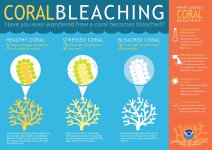A warning for other ecosystems
The Chagos reefs could potentially recover – if they are spared from more heat waves. Even a 10% recovery would make the reefs stronger for when the next bleaching occurs. But recovery of a reef is measured in decades, not years.
So far, research missions that have returned to the Chagos reefs have found only meager recovery, if any at all.
We knew the reefs weren’t doing well under the insidious march of climate change in 2011, when the global reef expedition started. But it’s nothing like the intensity of worry we have now in 2021.
Coral reefs are the canary in the coal mine. Humans have collapsed other ecosystems before through overfishing, overhunting and development, but this is the first unequivocally tied to climate change. It’s a harbinger of what can happen to other ecosystems as they reach their survival thresholds.
Minor heat waves can be devastating for reefs, Miami University Professor Sam Purkis explains what it feels like to witness one die.

www.weforum.org








